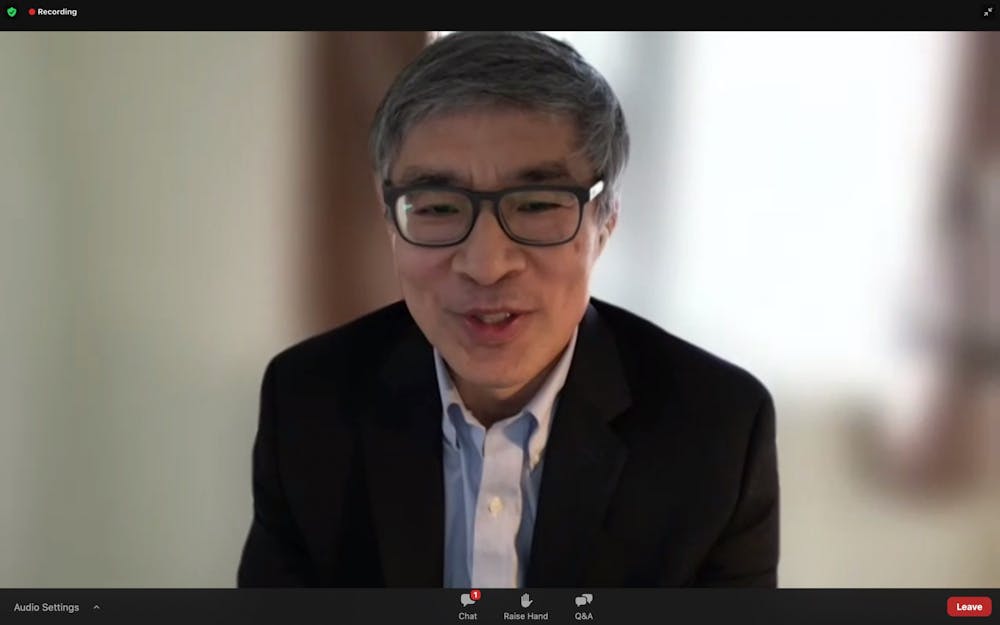The University’s East Asia Center and Department of Media Studies hosted Goubin Yang, Grace Lee Boggs professor of communication and sociology at the University of Pennsylvania, for a lecture titled “The Wuhan Lockdown and the Limits of Critique” Friday. Yang centered his lecture around his new book — The Wuhan Lockdown, published last month — which provides insight into the early days of the world’s first large-scale lockdown during the COVID-19 pandemic.
Yang’s book explores the narratives of Wuhan residents and aims to coax readers into realizing the importance of empathy and sympathy in the reading experience, Yang said. This perspective of putting oneself in front of the text and opening oneself up to critical personal engagement to the topics presented on a page is called the post-critical approach, a term coined by English Prof. Rita Felski.
The lockdown in Wuhan — the largest city of the Hubei province in China — began in January 2020 in response to the discovery and surge of the COVID-19 cases. The lockdown was not lifted until April 6 — 76 days after it was first instituted.
Yang made it a point of his book to include untold narratives of Wuhan residents, given that their virtual nonexistence in U.S mainstream media coverage meant that many Americans were in the dark about the initial lockdown and its impacts.
“The pressing question for me in writing the book was not about how to theorize experiences, but how to bring their voices and stories hopefully to public discourse,” Yang said.
Yang accomplished this task by dedicating several chapters of his book to raw narratives of members of the Wuhan community, which he gathered from online diaries on Weibo as well as WeChat. Both popular social media platforms in China, Yang noted that they enabled him to gather a significant number of accounts from a broad range of people, especially during a time when reaching out in-person wasn’t possible. Throughout it all, Yang focused on gathering diverse perspectives.
“The lockdown tests the lives of tens of millions of people in a city of 11 million,” Yang said. “And one of my goals was to recreate the galaxy of characters in Wuhan. Stories of people from all walks of life — healthcare workers, patients, therapists, volunteers, poets, writers, delivery drivers, retirees, retired teachers, and so on.”
Yang still uses the term “characters” to describe the real stories of the people he shares in his book, which adds an intentional air of fictionality to them. Yang said he did this for different reasons. A narrative, Yang said, implies a linear story, and the events of the pandemic in Wuhan were anything but linear or orderly but were rather “fluid” and “messy.” Most importantly, Yang said the nature of the sources — narrative stories posted by individuals on the Internet — mean that the stories are inherently fictionalized, in a sense.
“It is through social media that they gained public attention,” Yang said. “Once their stories were shared on social media, they became public figures. Social media users talked about them, tweeted, and retweeted stories about them as if they were characters in an ongoing drama.”
As a result, Yang pointed out that particular aspects of people’s accounts are both potentially edited and subject to dramatization. A particular example of this provided by Yang is the story of Dr. Li Wenliang, a Chinese doctor who was one of the first whistleblowers to warn everyone of the dangers of COVID-19.
Wenliang died from COVID-19 in February 2020 and as a way to pay tribute, people reshared the contents of his old Weibo posts. Wenliang became the “Wailing Wall of the Chinese Internet,” Yang said, as countless people shared postmortem posts on his Weibo timeline, asking him for guidance as well as providing personal life updates to him.
Such an example prompted Yang to leave listeners with questions about the narrative components of the COVID-19 pandemic.
“Can we say the limits of life are transcended through storytelling?” Yang asked. “Can the limits of critique also be transcended through storytelling? Or perhaps the question is not about transcendence, but about the awareness of limits.”
At the end of the lecture, Yang was asked by Aynne Kokas, associate professor of media studies, what it was like to write this book during such a difficult time. Yang responded by talking about how the relevancy of the topic influenced his writing process
“Because you are in the middle of things, you are deeply committed emotionally, full of energy and enthusiasm,” Yang said.
Looking to the impacts of the COVID-19 pandemic aside from the death toll, Yang discussed how impressive it was to see Wuhan citizens step into roles of organizers, volunteers, counselors and protestors, leaving Americans with an extraordinary precedent to follow — not just in the COVID-19 pandemic, but in any time of crisis and uncertainty.







